Catch 22. It’s all you have to say to explain a ridiculous situation that is created by contradictory rules.
The phrase comes from the classic book Catch 22 by Joseph Heller. The book is set in Italy during World War II where the main character, Yossarian, is a bombardier who must fly dangerous missions. The military keeps raising the number of missions he must fly to complete his service, which frustrates him. The problem is that a man is considered insane if he willingly continues to fly missions. He’s considered sane if he requests not to fly those missions, and is then forced to fly them because he has proven his sanity by asking not to fly them. Catch 22.

The setting for the book is during World War II, but the book is not condemning that war. Instead, it is using that war as a backdrop to question the militaristic system our country created after the war. And it’s not just the military; the book lambasts any organizational structure that serves the organization more than the people in that organization.
Catch 22 became wildly popular as the 60’s turned into a decade of turbulence. The book spoke to a Vietnam War era audience that saw our leaders seeking to get out of the war but not knowing how to do so “with honor”. Catch 22 is one of the most clever condemnations of bureaucratic thinking run amok, so it naturally hit home in an era when America was questioning all of the leading institutions.
I first read this book in high school during the 70’s as Vietnam was winding down and Watergate was heating up. I loved Heller’s storyline because it was poking fun at the establishment — an establishment that I was raised to respect but be wary of. No matter what political views my family had (and it was varied with who you asked), each of us were then and remain distrustful of big … well, big anything. I was taught, without ever being told, to be skeptical of big government, big business, big media, and big institutions.
Let me emphasize that again. Skepticism was never overtly taught in our family. I was never told “don’t trust big government” or anything like that. But it was modeled for me. Self-determination was a highly valued trait in our family, and self-dependency was a strength to be admired. As I pointed out to my son recently, he can go back through centuries of family history and find that every one of his forefathers was self-employed. Working for the establishment is just not in our DNA.
When I read Catch 22 for the first time, it immediately became part of my language and world view. Here was a book that made me laugh, made me think, and gave expression to the general wariness that I had toward any “big” programs. At a time when it was easy to distrust the government, Catch 22 added fuel to the fire with a clever storyline that seemed so innocent at first. Only when you get swept up into the ridiculousness of it all do you find yourself laughing out loud at the insanity.
A book that gave voice to a developing value of mine at an age when I was establishing my own values … that’s a book that you remember forever. Thus Catch 22 is on my list of the books that most influenced my life.
Want to read more of my top 25? Here is the list thus far:
Celebration of Discipline – #1
The Hobbit and The Lord of the Rings – #2
The Cost of Discipleship – #3
The Screwtape Letters – #4
Adventures of Huckleberry Finn – #5
Only the Paranoid Survive – #6
The Spy Who Came In From The Cold – #7
The Hitchhiker’s Guide to the Galaxy – #8
Truman – #9
Shantaram – #10
The Maltese Falcon – #11
The Shadow of the Wind – #12
Survey of the New Testament – #13
Calvin & Hobbes – #14
Celtic Daily Prayer – #15
Managing the Nonprofit Organization – #16
A Wrinkle in Time – #17
The Practice of the Presence of God – #18
Catch 22 – #19
The Tortilla Curtain – #20
The Kingdom of God is a Party – #21
Earthkeeping – #22
Reviving Ophelia – #23
The Grapes of Wrath – #24
Peanuts – #25
